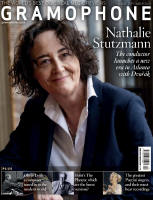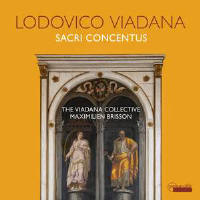Texte paru dans: / Appeared in:
|
|
|
|
|
|
Lodovico Grossi da Viadana’s groundbreaking Cento Concerti ecclesiastici (Venice, 1602) was the first publication of sacred music to include mandatory basso continuo accompaniment. The Viadana Collective’s artistic director and trombonist Maximilien Brisson prefers the ‘much more adventurous’ follow-up, Cento Concerti a una voce sola (1614), which splits its 100 solo motets equally between the customary four voice types. Nearly a dozen of these ‘sacred concertos’ are chosen for programmatic clusters devoted to the Nativity, the Passion of Christ, Corpus Christi and so on. Roland Faust’s cheerful conversational ease makes mincemeat of staggering vocal leaps yet also applies searing solemnity (De profundis). Charles Daniels’s supple fluency, harmonic intuition and communication of words is top-notch (Ardens est cor meum). Suzie LeBlanc’s subtle shading offers supplicatory vulnerability (O dulcissime Jesu) and Vicki St Pierre conveys dignity and nuanced melodicism (O Domine Jesu). Recorded in Mantua’s Basilica di Santa Barbara, its historic Antegnati organ (1565) is deployed for vivid continuo accompaniments, and organist Iason Marmaras also improvises several solos magisterially. Further sonic variety is cultivated by presenting some solo motets instrumentally, spotlighting violinist Anna Noelle Amstutz (Festina quaesumus), trombonists Catherine Motuz and Brisson (O praeciosum) and cornettist Bruce Dickey (who delivers spellbinding poeticism and adroit diminutions in O quam suavis). An assortment of pieces drawn from other Viadana sources are approached in several alternative ways. The five-voice spiritual madrigal Il sangue a pena havesti is performed translucently by a mixed consort of soprano, alto and bass with cornett and trombone. Solemn four-part motets are sung entirely a cappella (Vinea mea electa) or combine Faust on the bass line with the other three voice parts played by cornett and trombones (Tenebrae factae sunt). The survey is bookended by eightvoice motets Hodie nobis coelorum Rex and Si acuero ut fulgur that exploit the sonorous possibilities achieved by combining everyone together in bolder set pieces. The Viadana Collective’s consummately expert music-making and devotional expressivity conjure a glimpse of an untapped treasure trove. |
|




